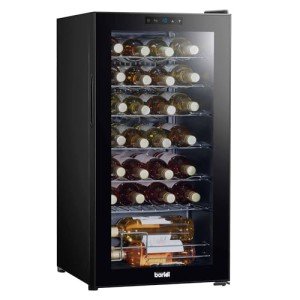10 Things We All Are Hateful About Fridge To Buy

The Ultimate Guide to Choosing the Right Refrigerator for Your Home
Introduction
Choosing a refrigerator is a significant decision for any family. With a plethora of options readily available, recognizing the best design for your needs can be daunting. This guide will check out various refrigerator types, essential functions, and ideas for making a knowledgeable purchase. Whether you are moving into a brand-new home or just aiming to replace an old model, this details will help in picking the fridge that best fits your lifestyle.
Kinds of Refrigerators
When shopping for a refrigerator, comprehending the different types readily available can simplify the choice procedure. Here's a breakdown of some typical refrigerator types:
| Refrigerator Type | Description |
|---|---|
| Top-Freezer | One of the most traditional styles, with the fridge area on top and the freezer below. |
| Bottom-Freezer | Features the fridge on top for easy access, with the freezer situated underneath. |
| Side-by-Side | Contains 2 vertical compartments; one for the fridge and one for the freezer, permitting more organization. |
| French Door | Combines a bottom freezer with double fridge doors, offering ample area and modern visual appeals. |
| Compact | Smaller sized size perfect for minimal spaces or secondary kitchens. |
| Smart Refrigerator | Geared up with innovative technology for connectivity and benefit, consisting of touch screens and internal cams. |
Choosing Your Refrigerator Type
- Area Availability: Measure the area where you plan to put the refrigerator, considering door openings and clearance.
- Storage Needs: Think about your typical grocery shopping routines and meal preparation.
- Design Preferences: Consider the kitchen area's visual appeals-- modern, standard, or minimalist.
Key Features to Consider
Apart from type, different functions make refrigerators more practical and easy to use. Here are essential considerations:
- Energy Efficiency: Look for Energy Star-rated designs that take in less electricity, saving you money in the long run.
- Capability: Measured in cubic feet, ensure the fridge's capability fulfills your household needs. A great guideline of thumb is 4-6 cubic feet per adult.
- Adjustable Shelving: Shelving that can be moved or customized to accommodate bigger products can be incredibly advantageous.
- Humidity Control: Many fridges included crisper drawers that control humidity, enhancing the durability of fruits and veggies.
- Water and Ice Dispensers: Added benefit for those who need simple access to drinking water and ice.
- Smart Home Integration: Consider if you want a fridge that links with your clever home devices for added functionality.
Pros and Cons of Refrigerators with Ice and Water Dispensers
| Pros | Cons |
|---|---|
| Benefit of having ice and water easily available | Potential for leakages or upkeep issues |
| Saves space on kitchen counters for water pitches | Greater preliminary purchase cost |
| May increase home resale worth | Needs access to plumbing |
Budgeting for Your Refrigerator
Developing a budget is essential when selecting a refrigerator, as costs can differ significantly based on brand, type, and functions. Here's a breakdown of the common rate ranges:
| Refrigerator Type | Rate Range (GBP) |
|---|---|
| Top-Freezer | ₤ 400 - ₤ 1,000 |
| Bottom-Freezer | ₤ 600 - ₤ 1,500 |
| Side-by-Side | ₤ 800 - ₤ 2,500 |
| French Door | ₤ 1,500 - ₤ 3,000 |
| Compact | ₤ 150 - ₤ 800 |
| Smart Refrigerator | ₤ 1,500 - ₤ 5,000 |
Tips for Sticking to Your Budget
- Do Your Research: Compare prices throughout different merchants.
- Look for Deals: Shop throughout holiday sales or clearance occasions.
- Focus on Features: Determine which features are vital vs. nice to have.
Often Asked Questions (FAQs)
1. How long do refrigerators typically last?
Most fridges have a lifespan of around 10-20 years, depending upon usage and upkeep.
2. Should I invest in a clever refrigerator?
If you focus on connection and convenience, wise models might be worth it. Nevertheless, think about the greater in advance costs and potential upkeep.
3. What upkeep does a refrigerator need?
Routine cleaning of coils, checking door seals, and defrosting freezers (if essential) are essential for keeping a refrigerator's performance.
4. How do I know if I'm selecting the ideal size for my refrigerator?
Think about home size, storage requirements, and available kitchen area area. Follow the general guideline of 4-6 cubic feet of space per grownup.
5. Are energy-efficient refrigerators worth the investment?
While initial expenses may be greater, energy-efficient designs can save you money on energy expenses in time.
Selecting the ideal refrigerator includes assessing numerous factors, consisting of type, functions, price, and your specific needs. Understanding the distinctions in between designs and considering factors such as energy effectiveness will assist you make an informed decision. By following Eli Muellerleile and utilizing the supplied contrasts and suggestions, you will be well-equipped to discover a refrigerator that fits your kitchen area and enhances your every day life.
In conclusion, the best refrigerator not only keeps your food fresh but also matches your home's aesthetic appeals and performance. Take your time in making this essential decision to ensure you choose a model that best serves your needs for many years to come.

